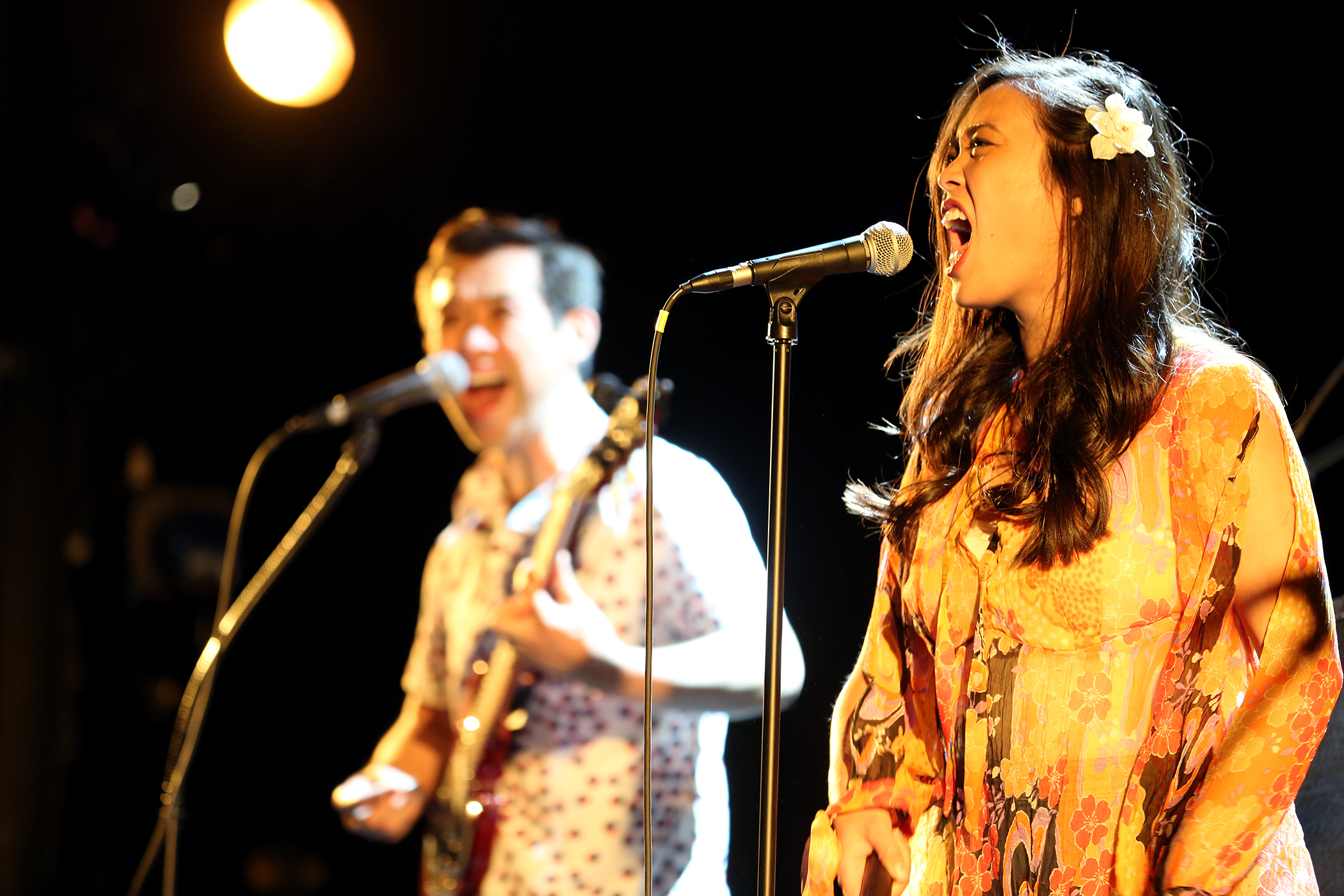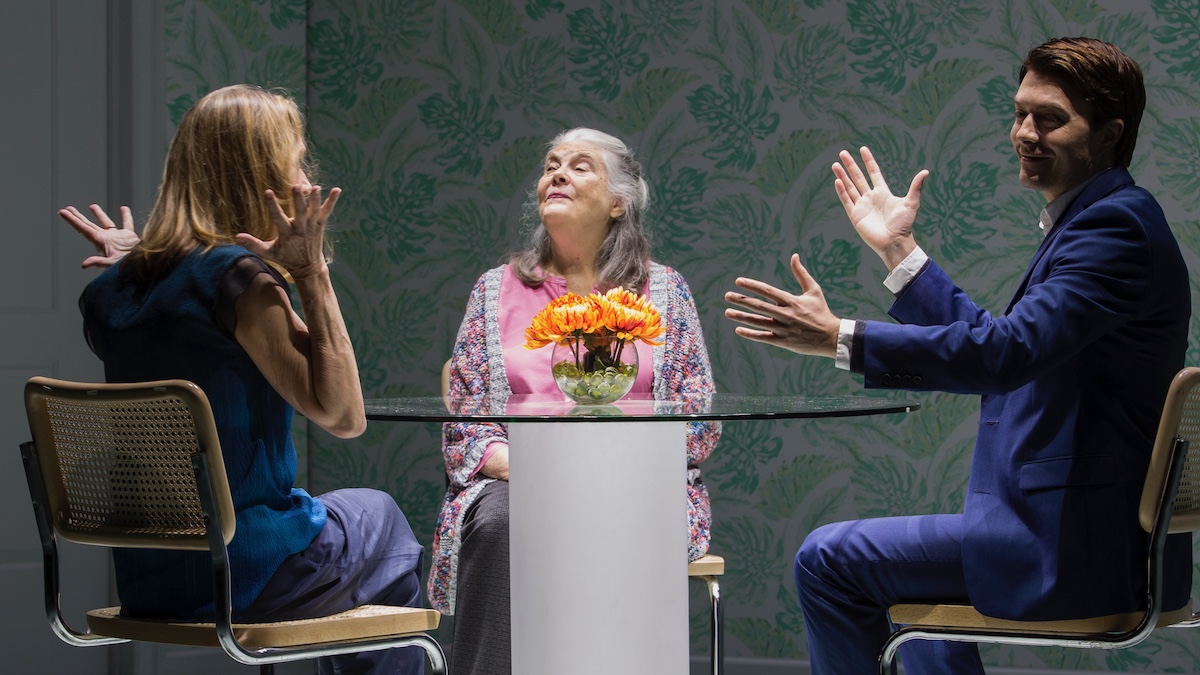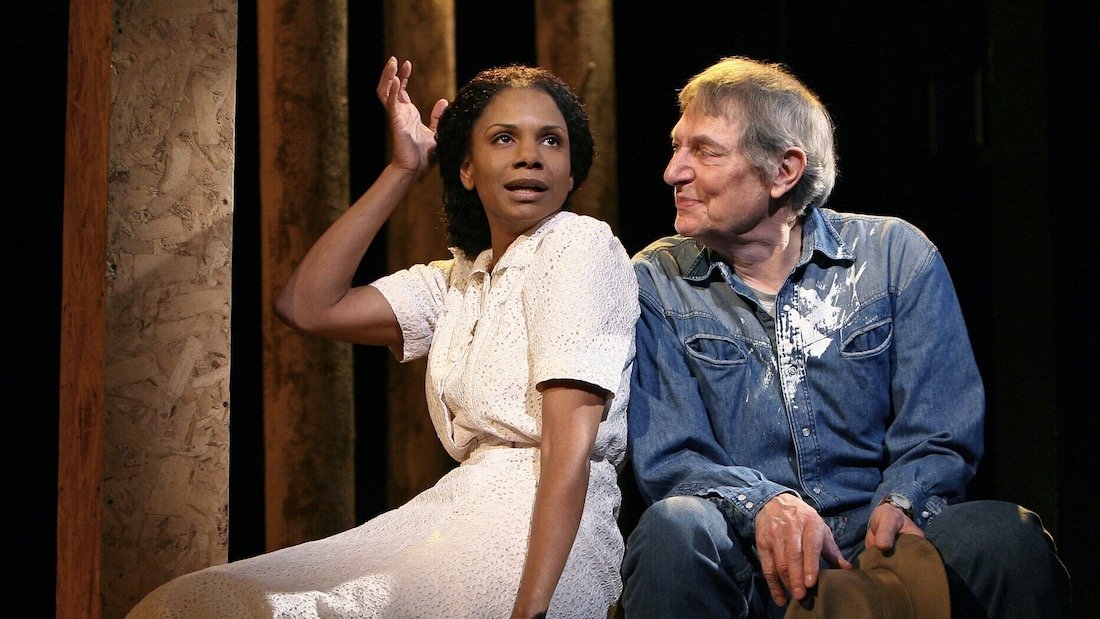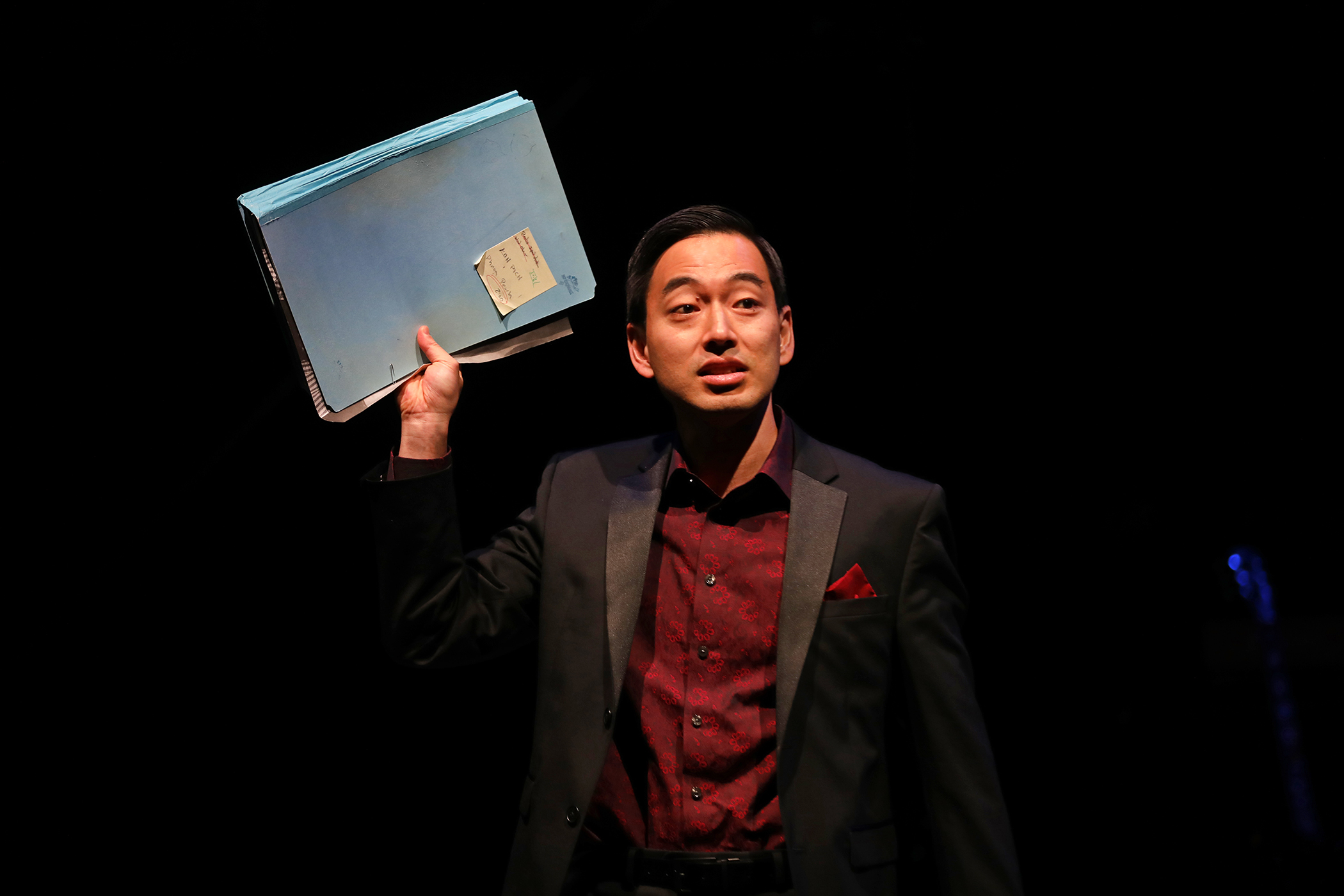
Lauren Yee’s Cambodian Rock Band begins in 2008, in Phnom Penh, Cambodia, where Neary, a young Cambodian-American woman, has been living for the past two years. Neary works for an NGO that is building a case against officials in the former Khmer Rouge regime, whose control of the country from 1975-79 resulted in the deaths of more than two million Cambodians, including most of the country’s artists and musicians. Little documentation of the Khmer Rouge’s nefarious deeds remains, however, save for the records from Tuol Sleng Prison, or S-21, where, out of 20,000 prisoners, only seven survived. Within the files of S-21’s commander, Comrade Duch, Neary makes a startling discovery—a picture of a possible eighth survivor. Although no name appears on the photograph of the young man, scribbled on the back are five words: “Keep for use. For now.” Neary is convinced that she’s found the smoking gun in the case against Duch.
But just as Neary is about to launch her search for the eighth survivor, she is derailed by the arrival of her father, Chum. Chum fled Cambodia in 1979 and hasn’t returned since, but he has come back to tell his daughter to stop pursuing Duch’s case and to bring her home to the United States. Neary, however, won’t be persuaded. As she presses her father for more information about his return to Cambodia, his cheerful veneer begins to crack. And, for the first time in 30 years, Chum must face the music of his past.
Cambodian Rock Band is a play with music, with a cast of six that forms a rock band at the play’s center. While the music isn’t used to further the plot (as it would in a traditional musical), it is integral to the storytelling. Its sound—1960s surf-rock with a distinctly Cambodian feel—complements the emotional journey and infuses the play with an unrestrained energy. It reaches out and grabs the audience and invites them to revel in a unique musical genre almost lost during the Khmer Rouge regime.
While a number of the play’s songs are arrangements of Cambodian oldies from the 1960s and ’70s—songs made famous by the era’s superstars, such as Ros Serey Sothea, Sinn Sisamouth and Yol Aularong—more than half are from the catalogue of Dengue Fever, an LA-based band that has gained a national reputation for its Khmer-influenced psychedelic rock. Since releasing its first album in 2003, Dengue Fever’s visibility has consistently grown and the band now has an enormous following across the country—including playwright Lauren Yee, who credits the first time she saw Dengue Fever play as part of Cambodian Rock Band’s inspiration:
“Dengue Fever was my gateway to Cambodia’s wild musical past,” Yee said in an interview with SCR. “[Their music] felt fresh, electric, but also, so very familiar. I immediately went home to delve into their catalog and discovered the actual Cambodian oldies of the ’60s and ’70s their music draws inspiration from. And with this music, I learned not only about Cambodia’s incredible music scene, but also the tragic fate of so many of those musicians once Pol Pot and the Khmer Rouge took over the country for four terrifying years. Even then, I knew this history all added up to a play, but for years, I had no idea of how to do this.”
Lauren Yee
Then, in early 2015, SCR commissioned Yee as a part of the CrossRoads Initiative, a program that brings playwrights into Orange County for residencies to explore the area’s culturally diverse communities. (SCR audiences may remember the theatre’s recent productions of Qui Nguyen’s Vietgone, Aditi Brennan Kapil’s Orange and Dipika Guha’s Yoga Play, all of which were commissioned as a part of CrossRoads.) That summer, Yee spent much of her 10-day visit to Southern California engaging with the local Cambodian-American communities in the cities of Anaheim and Long Beach. In addition to meeting with local residents, enjoying events in Long Beach’s Cambodia Town and attending the Cambodian Music Festival in Anaheim, she had the opportunity to see Dengue Fever play again—this time at Alex’s Bar in Long Beach.
Yee’s CrossRoads residency reinvigorated her interest in and her appreciation for Cambodia’s rich musical history, so it’s no surprise that only six months later, she completed the first draft of what would later become Cambodian Rock Band.
At its heart, Cambodian Rock Band tells an intimate story about a father-daughter relationship. (And, like many of Yee’s other plays, it’s wildly theatrical and wickedly funny.) But, it’s also about the choices made during a harrowing moment in history and, to tell that story, the play jumps back in time, to Cambodia in 1975 and 1978. There, the audience is thrust into a frightening place: the infamous S-21 Prison.
In April 1975, after the Khmer Rouge—a nickname given to Cambodia’s communist party—defeated the government forces of the U.S.-backed Khmer Republic in the Cambodian Civil War, they immediately began their cruel and ultimately futile attempt at social engineering. Under the leadership of Pol Pot, the Khmer Rouge planned to remake Democratic Kampuchea, as it would be renamed in 1976, into an agrarian utopia. They evacuated the cities, and sent inhabitants to live and work on collective farms in the countryside. They abolished money and the concept of private property and outlawed religion. They divided the population into the “old people,” rural Cambodians who had allied themselves with the Khmer Rouge prior to April 1975, and the “new people,” comprised of educated urbanites, artists and musicians, ethnic minorities, Buddhist monks and anyone else that the Khmer Rouge considered a danger to the regime.
Approximately one-quarter of Cambodia’s population died between April 1975 and January 1979. Many succumbed to starvation or disease on the collectives, while others were killed for minor crimes, such as stealing food. But those considered a major threat to the new order were sent to special extermination centers, where they were tortured into making false confessions and then summarily executed. The most famous of these centers was Tuol Sleng, or S-21 (an abbreviation for “Security Prison 21”), which was housed in a former high school in Phnom Penh.
During its operation, up to 20,000 people—including men, women and children—were executed at S-21. Torture techniques such as electrocution, whippings and beatings, waterboarding and force-feeding excrement and urine were used to coerce confessions, and many prisoners, most of whom were innocent of their suspected crimes, admitted to working for foreign powers such as the CIA, KGB and Vietnamese. Guilty prisoners were then executed, often at nearby Choeung Ek, the most famous of the Khmer Rouge “Killing Fields.” There, the condemned prisoners were made to kneel over mass graves as executioners slit their throats or delivered deadly blows to the back their heads. As an institution, S-21 was so efficient that only a handful of individuals are known to have survived their imprisonment.
For most of its operation, S-21 was run by Kang Kek Iew, better known as Comrade Duch, former teacher who was shrewd and meticulous. In 1979, when the Vietnamese successfully invaded Cambodia, Duch fled Phnom Penh, changed his name and later settled near the Thai-Cambodian border. But, in 1999, he was finally arrested and, in 2009, became the first war criminal to be tried in the UN-backed Extraordinary Chambers in the Courts of Cambodia.
With its challenging subject matter and its slippery tone, Cambodian Rock Band calls for a director who can effectively marry the play’s raucous and joyous music with its tragedy—and its dark sense of humor with its bursting heart. SCR’s production is helmed by Chay Yew, a celebrated director and playwright and the current artistic director of Victory Gardens Theater in Chicago. Yew makes his SCR debut with Cambodian Rock Band, but his extensive directing credits include productions at The Public Theater, Playwrights Horizons, Oregon Shakespeare Festival, Actors Theatre of Louisville and Goodman Theatre. Next season, Yew will produce the second production of Cambodian Rock Band at Victory Gardens.
The cast includes Brooke Ishibashi (Neary/Sothea), Abraham Kim (Rom/Journalist), Jane Lui (Pou/S-21 Guard), Joe Ngo (Chum) and Daisuke Tsuji (Duch), all of whom make their SCR debuts in the production, as well as Raymond Lee (Ted/Leng), whom SCR audiences may remember from his memorable performances in Office Hour and Vietgone.
Cambodian Rock Band’s design team includes Takeshi Kata and Se Hyun Oh (sets), Sara Ryung Clement (costumes), David Weiner (lights) and Mikhail Fiksel (sound).
To purchase a copy of Cambodian Rock Band, click here, and to learn more about licensing a production, click here.

Inspired by True Events: A Conversation with Playwright Ryan Spahn

Plays About Technology




